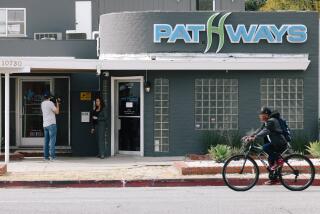‘Dr. Death’ Arrested in 2 Women’s Suicides : Crime: Ex-Michigan pathologist Jack Kevorkian is confined briefly on murder charges.
- Share via
CHICAGO — A Michigan doctor who envisioned establishing a nationwide network of suicide clinics and who admitted helping three women kill themselves was arrested Wednesday on murder charges stemming from two assisted suicides.
Jack Kevorkian, the former pathologist known as “Dr. Death” for his advocacy of physician-assisted suicide, was charged with two counts of murder and one count of delivery of a controlled substance for his role in assisting the deaths of two chronically ill women in October.
Kevorkian had assisted the women despite being under a permanent injunction banning him from ever again helping anyone commit suicide.
Oakland County (Mich.) Prosecutor Richard Thompson, who unsuccessfully prosecuted Kevorkian in a previous assisted suicide case in 1990, said he hopes to show in court that Kevorkian, 63, caused the deaths of the other two women by attaching them to death-dealing devices.
Released after several hours of confinement, Kevorkian said being jailed could not compare with the fates of people who may be ill or in pain.
“This isn’t suffering. There are humans out there suffering. I’m not suffering,” he said.
His attorney, Geoffrey Fieger, told Oakland County Circuit Judge Richard Kuhn at an arraignment hearing that “there is no crime of assisting suicide in Michigan. . . . Dr. Kevorkian assisted those two ladies. That is not a crime.”
The women were Marjorie Wantz, 58, of Sodus, Mich., and Sherry Miller, 43, of Roseville, Mich. Wantz suffered from a pelvic disease that caused debilitating pain and Miller from multiple sclerosis, a degenerative disease that made her dependent on her family. Neither woman was considered to be terminally ill. A medical examiner listed the deaths as homicide.
“Sherry Miller was gassed to death,” said Thompson. “She couldn’t put the gas mask on her own face so Dr. Kevorkian affixed the gas mask to her face. And after she pressed the lever to start the carbon monoxide poisoning there was no way she could turn it off by herself.”
Thompson said Wantz was attached by Kevorkian to a device similar to the so-called “suicide machine” he used in the assisted suicide of Janet Adkins, the Oregon woman whose 1990 death first brought Kevorkian to prominence. The device delivered three solutions into Wantz’s bloodstream.
The first was a saline solution that opened the veins. The second was an anesthetic, methohexital, which Thompson said is a controlled substance. The third chemical was potassium chloride, which Thompson said brought on a heart attack that caused Wantz’s death.
Two witnesses present at the time of the deaths were given immunity and testified to a grand jury about the role Kevorkian played in the deaths, Thompson said. Kevorkian, whose medical license was revoked last year by the Michigan Board of Medicine, invoked his Fifth Amendment right not to testify.
Murder charges filed against Kevorkian after Adkins’ death were later dismissed because Michigan has no law banning suicide and a judge said prosecutors had failed to prove that Kevorkian had committed murder.
Acknowledging that the right-to-die issue is emotionally charged and that juries in the past have been reluctant to hand down guilty verdicts in assisted suicide cases, Thompson noted that this time the charges were brought by a grand jury rather than by his office.
“I think it would be a perilous public policy for us to start allowing this (physician-assisted suicide) because there is no way to stop it,” Thompson said Wednesday. “It would be left to the whim of individual physicians to decide who is going to live and who is going to die.”
The Oregon-based National Hemlock Society, which supports physician-assisted suicide, has kept its distance from Kevorkian.
“Michigan needs to clarify the legal status of assisted suicide because there is conflicting case law in that state,” said Cheryl K. Smith, the organization’s staff attorney.
More to Read
Sign up for Essential California
The most important California stories and recommendations in your inbox every morning.
You may occasionally receive promotional content from the Los Angeles Times.













